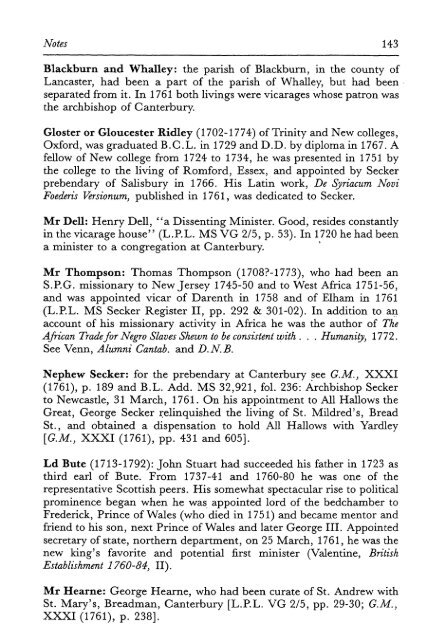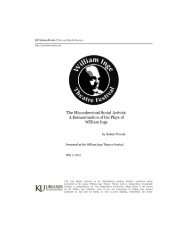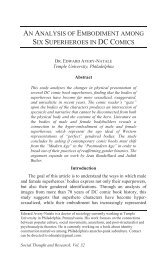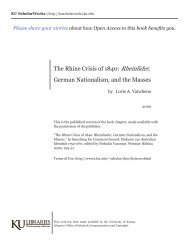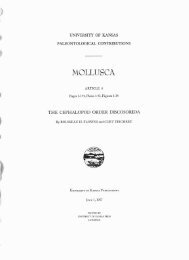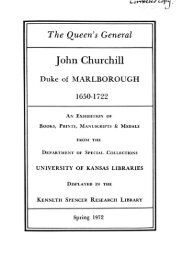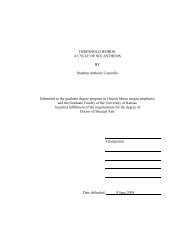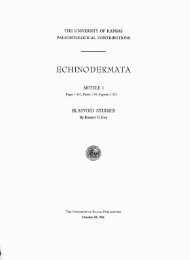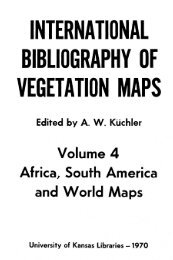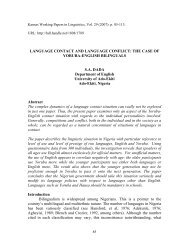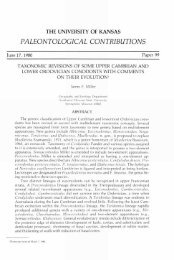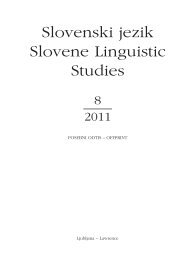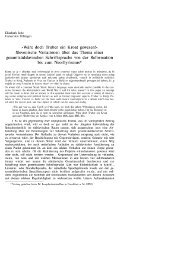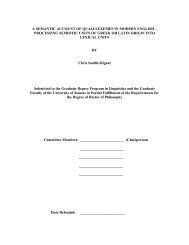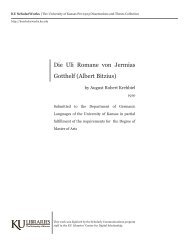Archbishop of Canterbury - KU ScholarWorks - The University of ...
Archbishop of Canterbury - KU ScholarWorks - The University of ...
Archbishop of Canterbury - KU ScholarWorks - The University of ...
You also want an ePaper? Increase the reach of your titles
YUMPU automatically turns print PDFs into web optimized ePapers that Google loves.
Notes 143<br />
Blackburn and Whalley: the parish <strong>of</strong> Blackburn, in the county <strong>of</strong><br />
Lancaster, had been a part <strong>of</strong> the parish <strong>of</strong> Whalley, but had been<br />
separated from it. In 1761 both livings were vicarages whose patron was<br />
the archbishop <strong>of</strong> <strong>Canterbury</strong>.<br />
Gloster or Gloucester Ridley (1702-1774) <strong>of</strong> Trinity and New colleges,<br />
Oxford, was graduated B.C.L. in 1729 and D.D. by diploma in 1767. A<br />
fellow <strong>of</strong> New college from 1724 to 1734, he was presented in 1751 by<br />
the college to the living <strong>of</strong> Romford, Essex, and appointed by Seeker<br />
prebendary <strong>of</strong> Salisbury in 1766. His Latin work, De Syriacum Novi<br />
Foederis Versionum, published in 1761, was dedicated to Seeker.<br />
Mr Dell: Henry Dell, "a Dissenting Minister. Good, resides constantly<br />
in the vicarage house" (L.RL. MS VG 2/5, p. 53). In 1720 he had been<br />
a minister to a congregation at <strong>Canterbury</strong>.<br />
Mr Thompson: Thomas Thompson (1708P-1773), who had been an<br />
S.RG. missionary to New Jersey 1745-50 and to West Africa 1751-56,<br />
and was appointed vicar <strong>of</strong> Darenth in 1758 and <strong>of</strong> Elham in 1761<br />
(L.P.L. MS Seeker Register II, pp. 292 & 301-02). In addition to an<br />
account <strong>of</strong> his missionary activity in Africa he was the author <strong>of</strong> <strong>The</strong><br />
African Trade for Negro Slaves Shewn to be consistent with . . . Humanity, 1772.<br />
See Venn, Alumni Cantab, and D.N.B.<br />
Nephew Seeker: for the prebendary at <strong>Canterbury</strong> see G.M., XXXI<br />
(1761), p. 189 and B.L. Add. MS 32,921, fol. 236: <strong>Archbishop</strong> Seeker<br />
to Newcastle, 31 March, 1761. On his appointment to All Hallows the<br />
Great, George Seeker relinquished the living <strong>of</strong> St. Mildred's, Bread<br />
St., and obtained a dispensation to hold All Hallows with Yardley<br />
[G.M., XXXI (1761), pp. 431 and 605].<br />
Ld Bute (1713-1792): John Stuart had succeeded his father in 1723 as<br />
third earl <strong>of</strong> Bute. From 1737-41 and 1760-80 he was one <strong>of</strong> the<br />
representative Scottish peers. His somewhat spectacular rise to political<br />
prominence began when he was appointed lord <strong>of</strong> the bedchamber to<br />
Frederick, Prince <strong>of</strong> Wales (who died in 1751) and became mentor and<br />
friend to his son, next Prince <strong>of</strong> Wales and later George III. Appointed<br />
secretary <strong>of</strong> state, northern department, on 25 March, 1761, he was the<br />
new king's favorite and potential first minister (Valentine, British<br />
Establishment 1760-84, II).<br />
Mr Hearne: George Hearne, who had been curate <strong>of</strong> St. Andrew with<br />
St. Mary's, Breadman, <strong>Canterbury</strong> [L.P.L. VG 2/5, pp. 29-30; G.M.,<br />
XXXI (1761), p. 238].


